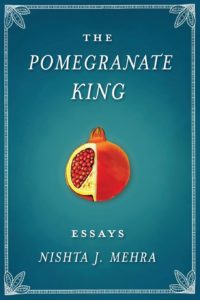The Pomegranate King is a collection of twelve essays by Nishta Mehra on topics ranging from growing up in Memphis to grappling with identity to grieving a parent to falling in love to making meaning out of all facets of life. The following excerpt is from an essay called “Mixed.”
 “Honey, are you mixed?” It was a question I had never been asked before, let alone in a drive-through line by a complete stranger holding out the change for mine and my mother’s order. Backyard Burger is Memphis’ homegrown hamburger franchise, and they make a pretty decent drive-through burger for the money. One taste of their thick-cut waffle fries takes me right back to the feeling of a new driver’s license and Saturday afternoons. My mom, the vegetarian, loves them for the flavorful vegetarian patties which they cook, considerately, on a separate grill.
“Honey, are you mixed?” It was a question I had never been asked before, let alone in a drive-through line by a complete stranger holding out the change for mine and my mother’s order. Backyard Burger is Memphis’ homegrown hamburger franchise, and they make a pretty decent drive-through burger for the money. One taste of their thick-cut waffle fries takes me right back to the feeling of a new driver’s license and Saturday afternoons. My mom, the vegetarian, loves them for the flavorful vegetarian patties which they cook, considerately, on a separate grill.
At first I thought the drive-through attendant had asked “Do you want ketchup with that?” because her tone was so glib, as if she questioned each customer about the origins of their skin color, as if it were company policy, like saying “Have a nice day!” even when you don’t really mean it. I didn’t even understand the question at first, let alone comprehend that I might be legitimately offended by it. Instead, I looked up at my questioner’s full, dark-skinned face, said “What?” and listened as she repeated her question.
“Oh…um, no. I’m Indian,” I answered finally, too well-trained to blow her off — one does not match rudeness with rudeness — but utterly unable to compose an appropriate response. What is the appropriate response in a situation like that, anyway? To turn snobby or cold would reify the very social color strata that likely led to this awkward question-and-answer session in the first place.
I continued out of habit, to clarify that I didn’t mean the kind of Indian that kids stereotypically pantomime for backyard play: “I mean, my family’s from India. My parents are.” I saw her glance at my mother, who has been mistaken for or assumed to be all of the following ethnicities at least once: Greek, Russian, Italian, Korean, Native American, Chinese, Mexican, Caucasian. I, on the other hand, have my father’s unmistakably dark brown skin, made browner by my penchant for sunshine. My skin is as dark or darker than several African-American friends of mine. I understood what this woman was seeing: in the world of Memphis, where there is only black or white, I looked like the daughter of a white mother and a black father.
When I counteracted that assumption, though, and proved myself to be something else, outside the categories of Memphis black or white, the woman’s demeanor changed. Her body language, which had been imposing and superior, softened, and her tone became deferential.
“Oh,” she said. “Oh. ‘Cause you sure do have the prettiest skin.” I have always felt nervous around black women: the ones my mother works with, the young extra-fashionable ones I knew in school, the older ones behind the counters of the barbecue joints I favor. Partly this has to do with the fact that, for as long as I can remember, I have attracted black male attention. A noticeable amount. Without trying. And I can never shake the feeling I’m being eyed with suspicion by black women, because it’s clear that I am not from their world. I may put pepper sauce in my greens, and be able to keep up with the bantering talk, but no matter how dark my skin gets, no one is fooled; I have come from the white world.
Nishta J. Mehra is a fan of big conversations and good food. She spends her days working out what it means to live fully and joyfully: as a mother, teacher, daughter, friend, and spouse. Born and raised in Memphis, Tennessee, she lives with her partner Jill and their son Shiv in a suburb of Houston, Texas. Find more of her writing on her website, Blue Jean Gourmet.












